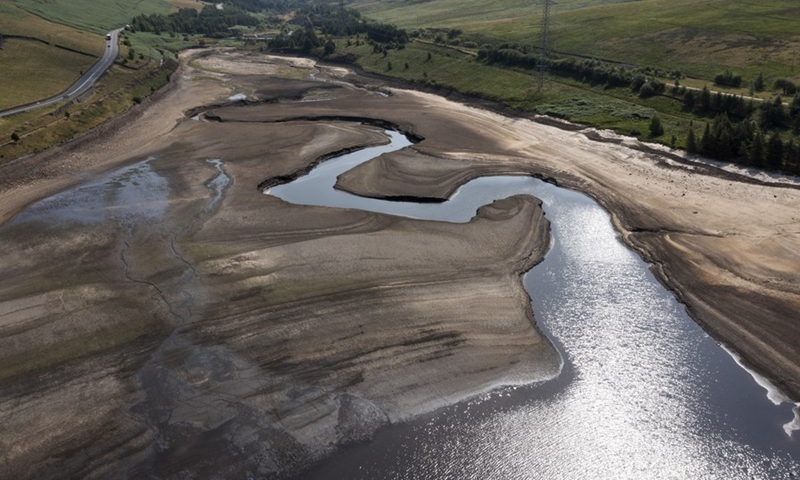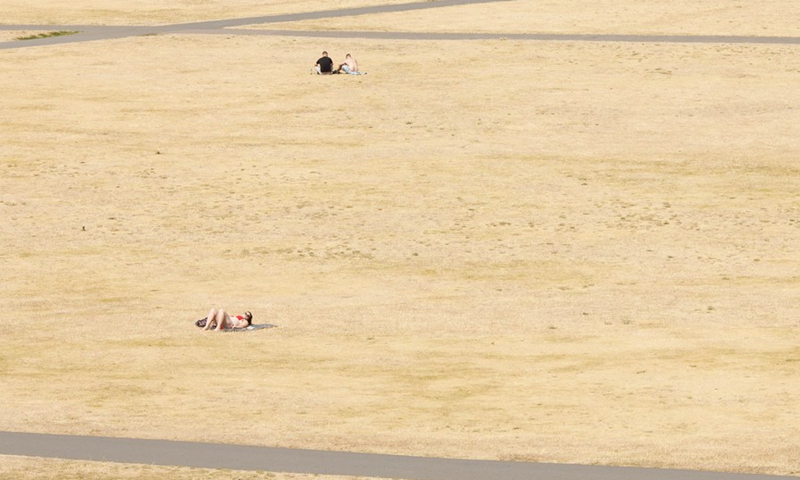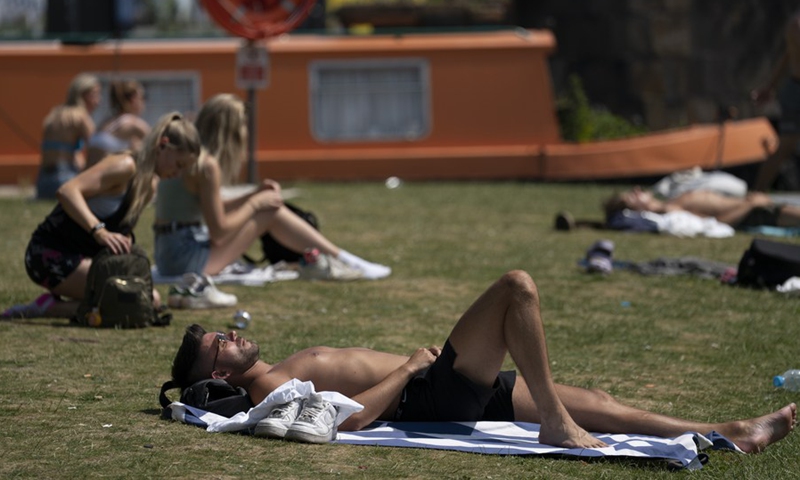
Aerial photo taken on July 19, 2022 shows the partially empty Woodhead Reservoir near Manchester, Britain.(Photo: Xinhua)

People sit in Greenwich Park in London, Britain, July 18, 2022.(Photo: Xinhua)

People sunbathe in central Manchester, Britain, July 19, 2022.(Photo: Xinhua)
The United Kingdom (UK)'s national weather service on Thursday raised the risk of severe fires to its highest level for this weekend, with another heatwave on the horizon.
HOT, DRY SUMMER
After the UK experienced its hottest day ever in mid-July, with parts of England seeing air temperatures of over 40 degrees Celsius, a new heatwave was set to hit this week. An amber extreme heat warning has been issued by the Met Office.
Temperatures are expected to peak at 35 degrees on Friday and Saturday, and at 36 degrees on Saturday. Elsewhere, temperatures into the high 20s and low 30s are expected, said Met Office Deputy Chief Meteorologist Dan Rudman.
Drought conditions are also expected to stay. After the driest July in England since 1935, little rain is forecast, with only the northwest of the UK likely to see quick showers, the Met Office said on Tuesday.
"While there are different definitions of drought, we are clearly facing drought conditions in many parts of England. Water levels in several major river systems are very low," said Hannah Cloke, professor of hydrology at the University of Reading.
Meanwhile, calls for restrictions on water use are growing. "Water companies are already managing the unprecedented effects of the driest winter and spring since the 1970s," said Water UK's Director of Communications Peter Jenkins.
With more hot and dry weather forecast, "it's crucial we should be even more mindful of our water use, to minimize spikes in demand and ensure there's enough to go around," said Jenkins.
Several companies have announced a localized hosepipe ban, under which people are not allowed to water lawns or plants, clean cars or fill paddling pools with hosepipes. Thames Water, responsible for the public water supply in most of Greater London, has also said such a ban will be introduced "in the coming weeks."
FIRE RISKS RISE
Amid drought conditions, the Fire Severity Index has been raised to "exceptional," the highest level, for much of southern England this weekend. The index is an assessment of how severe a fire could become if one were to start, not of the risk of fires occurring.
London Fire Brigade said Thursday that its control room had mobilized thousands of firefighters to tackle 340 grass, rubbish, and open land fires during the first week of August, an eightfold increase on the 42 fires during the same week last year.
"This summer has seen an unprecedented long, dry spell with high temperatures, so the grass in London is tinderbox dry and the smallest of sparks can start a blaze which could cause devastation," said Assistant Commissioner for Fire Stations with London Fire Brigade Jonathan Smith.
Fire services were once more under increasing strain after record heat in July.
"Just over a fortnight ago firefighters had to deal with many serious wildfires across much of the country. Several firefighters were injured and many people lost their homes," said Fire Brigades Union Assistant General Secretary Andy Dark.
However, Dark emphasized that instead of fire and rescue services being improved, 11,500 firefighters have lost their jobs since 2010.
"Understaffing has been so bad that throughout the last period of wildfires nearly all fire and rescue services in the most severely affected areas had to call up off-duty firefighters and ask them to perform extra shifts," Dark said.






